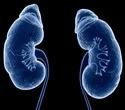Molecular routes to metastatic dissemination are critical determinants of aggressive cancers. Through in vivo CRISPR–Cas9 genome editing, we generated somatic mosaic genetically engineered models that faithfully recapitulate metastatic renal tumors. Disruption of 9p21 locus is an evolutionary driver to systemic disease through the rapid acquisition of complex karyotypes in cancer cells. Cross-species analysis revealed that recurrent patterns of copy number variations, including 21q loss and dysregulation of the interferon pathway, are major drivers of metastatic potential. In vitro and in vivo genomic engineering, leveraging loss-of-function studies, along with a model of partial trisomy of chromosome 21q, demonstrated a dosage-dependent effect of the interferon receptor genes cluster as an adaptive mechanism to deleterious chromosomal instability in metastatic progression. This work provides critical knowledge on drivers of renal cell carcinoma progression and defines the primary role of interferon signaling in constraining the propagation of aneuploid clones in cancer evolution. Using genetically engineered models, Genovese and colleagues study patterns of convergent evolution in renal cancer, and pinpoint dysregulation of interferon signaling as a means of adaptation to chromosomal instability in metastatic progression.
Research and publish the best content.
Get Started for FREE
Sign up with Facebook Sign up with X
I don't have a Facebook or a X account
Already have an account: Login
 Your new post is loading... Your new post is loading...
 Your new post is loading... Your new post is loading...
|
|













One of the hallmarks of renal cell carcinoma (RCC) is chromosomal instability, which is associated with resistance to many types of therapy and a poor prognosis. It is not known whether specific types of chromosomal abnormalities are involved in metastasis and how tumors are able to tolerate them. Researchers have used CRISPR/Cas9-based genome editing to generate models of aggressive renal cell carcinoma (RCC), lacking common tumor suppressor genes. Using genome sequencing and single-cell RNA sequencing to examine these models in more detail, the researchers uncovered the molecular drivers of RCC and gained a new understanding of the evolution of chromosomal instability. IFNR gene clusters are normally involved in the immune response. After analyzing various datasets from mice and humans, the researchers discovered an inverse correlation between the loss of these IFNR genes and aneuploidy, a condition characterized by an abnormal number of chromosomes. This study suggests that tumors adapt to high levels of chromosomal instability by disrupting the IFNR pathway, and that this is likely to be a major biomarker of metastatic potential. In future, the researchers plan to test drug combinations in these newly generated models to determine how tumors adapt to various therapies.